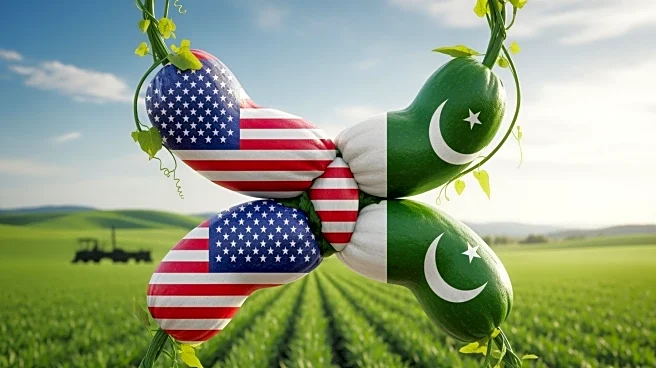What's Happening?
Federal Minister for National Food Security and Research Rana Tanveer Hussain met with Acting U.S. Ambassador to Pakistan Natalie A. Baker to discuss enhancing bilateral cooperation in agriculture and increasing agricultural trade between the two nations.
The meeting highlighted the U.S.'s significant role in Pakistan's agricultural development through joint projects and research initiatives aimed at improving resilience, sustainability, and productivity. Key programs under this cooperation include the Agricultural Linkages Program (ALP) and the Wheat Productivity Enhancement Project (WPEP), which have strengthened research capacity and produced improved wheat varieties. The U.S. has also supported Pakistan's agricultural education and research institutions, contributing to the growth of the dairy and livestock sectors. Both sides agreed to expand cooperation in areas such as hybrid crop research, local vaccine production, and agricultural mechanization.
Why It's Important?
The enhanced cooperation between the U.S. and Pakistan in agriculture is crucial for both countries. For Pakistan, it represents an opportunity to boost agricultural exports, particularly mangoes and horticultural products, to the U.S. through improved certification and export protocols. This partnership is expected to open new avenues for agricultural innovation, investment, and trade, contributing to a resilient and technology-driven agriculture sector. For the U.S., it strengthens ties with a key partner in South Asia, potentially increasing its influence in the region. The collaboration on genetic improvement programs for dairy and beef cattle could enhance productivity and export competitiveness, benefiting both countries economically.
What's Next?
Both countries plan to continue expanding cooperation in precision agriculture and digital farming technologies to improve efficiency and sustainability. The U.S. expressed interest in collaborating on genetic improvement programs for dairy and beef cattle, which could lead to enhanced productivity and export competitiveness. Pakistan aims to establish a Foot and Mouth Disease (FMD)-free zone in Bahawalpur and align its traceability system with international standards. These initiatives are expected to further strengthen the agricultural partnership and contribute to the economic growth of both nations.
Beyond the Headlines
The collaboration between the U.S. and Pakistan in agriculture could have broader implications for regional stability and economic development. By fostering innovation and sustainable practices, the partnership may serve as a model for other countries seeking to enhance their agricultural sectors. Additionally, the focus on technology-driven agriculture could lead to long-term shifts in how farming is conducted, potentially improving food security and environmental sustainability.















